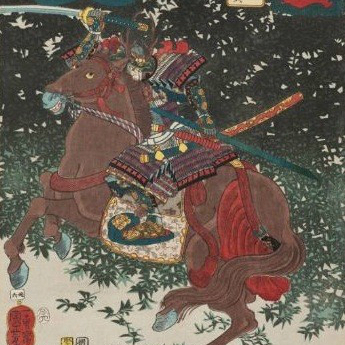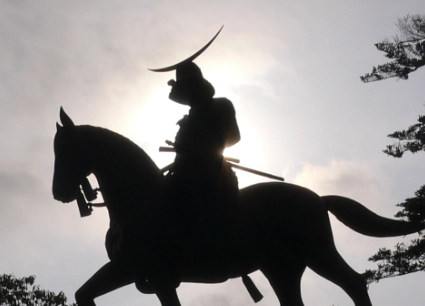ピンチの時こそ義が大事――戦国武将・高橋紹運の生き様
第十八回 SAMURAIファイル 高橋紹運
〈以下、英訳〉
TAKAHASHI JOUN
In this blog, I have often focused on samurai loyalty and obligations, the basis of the samurai way of life. This week we look at the exploits of Takahashi Joun, also known as Takahashi Shigetane,(1548-Sept.10 1586) a leading retainer of the Otomo Clan, loyal to his lord to the very end.
The Otomo of Kyushu had long been embattled in hostilities with the powerful Shimazu Clan. In 1586, the Shimazu Clan, in an effort to take all of Kyushu, launched an attack and siege against the strategically important Iwaya Castle under the command of Takahashi Joun. 50,000 Shimazu troops surrounded the 760 samurai inside the small castle. The potential for loss was great, however, such was the courage and determination of Joun, the castle would not fall easily. His small force fought bravely over the two week siege and retaliated with ferocity, leading to a great loss of life amongst the Shimazu samurai, but it was a losing battle.
Towards the final days of the siege, a Shimazu general approached the castle and spoke to Joun. “Lord Joun, we understand your great determination and strength, but you cannot hold out much longer. Why not surrender and serve Lord Shimazu instead?”
Joun’s answer was promptly given in a loud, clear voice.“ Many a man can swear his loyalty to his lord when that lord is strong, and betray him easily when he is weak and facing destruction. I was born a samurai, and I have a debt of gratitude to my master and his clan. A samurai who forgets that debt is lower than an animal! I cannot do as you suggest.”
Both enemy and ally alike admired his answer, and upon the enemy generals’ departure, and prior to the fall of Iwaya Castle, Joun took his own life in the manner peculiar to the samurai, rather than lose it to the enemy. He was 38 years old. Although he knew he could not win, Takahashi Joun refused to surrender, and fought for the integrity of his lord. For this he was much respected and praised as a great warrior by his enemy, the Shimazu.
Incidentally, at the Battle of Sekigahara, Tokugawa Ieyasu had invited the warrior Tachibana Muneshige to join his eastern forces, however Muneshige refused, bravely saying “It would be better to die than betray his lord, the late Hideyoshi.” Tachibana Muneshige had been adopted by the Tachibana clan prior to death of his biological father, Takahashi Joun.
The samurai showed courage, respect and great loyalty towards their masters, clans, friends and family in all situations. They refused to shirk their obligations and remained forever true.
Another lesson to learn from the samurai in these modern times.
- 1
- 2







